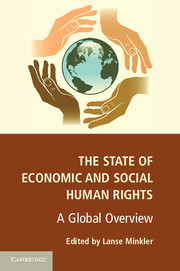Book contents
- Frontmatter
- Contents
- Contributors
- Acknowledgments
- 1 Introduction: Why Economic and Social Human Rights?
- I CORE RIGHTS
- II NONDISCRIMINATION
- III META
- 10 Establishing a Social and International Order for the Realization of Human Rights
- 11 Beyond a Minimum Threshold: The Right to Social Equality
- 12 The Right to Development from a Human Rights Approach: Conceptual Bases, Legal Framework, and Contemporary Challenges
- 13 Constitutional Environmental Human Rights: A Descriptive Analysis of 142 National Constitutions
- 14 Conclusion: Reflections on the Theory and Practice of Economic and Social Rights
- Index
10 - Establishing a Social and International Order for the Realization of Human Rights
Published online by Cambridge University Press: 05 February 2013
- Frontmatter
- Contents
- Contributors
- Acknowledgments
- 1 Introduction: Why Economic and Social Human Rights?
- I CORE RIGHTS
- II NONDISCRIMINATION
- III META
- 10 Establishing a Social and International Order for the Realization of Human Rights
- 11 Beyond a Minimum Threshold: The Right to Social Equality
- 12 The Right to Development from a Human Rights Approach: Conceptual Bases, Legal Framework, and Contemporary Challenges
- 13 Constitutional Environmental Human Rights: A Descriptive Analysis of 142 National Constitutions
- 14 Conclusion: Reflections on the Theory and Practice of Economic and Social Rights
- Index
Summary
UDHR Article 28. Everyone is entitled to a social and international order in which the rights and freedoms set forth in this Declaration can be fully realized.
Introduction
In his definitive study of the drafting history of the Universal Declaration of Human Rights (UDHR), Johannes Morsink (1999) has little to say about the purpose and meaning behind Article 28, giving only slightly more attention to accompanying Article 22, which serves as an introduction to the “new” economic, social, and cultural rights (ESCR) set forth in Articles 23–27. According to Morsink, some of the drafters of the UDHR took the view that the two articles essentially covered the same ground, and thus there was no need to include both of them together. However, this position was ultimately rejected. The only substantive discussion of Article 28 that Morsink (1999, 231–232) provides involves the use of the word “good” in the original draft: “Everyone has the right to a good social and international order in which the rights and freedoms set forth in this Declaration can be fully realized.” This vague adjective was later removed.
Based on this thin history, it is apparent that Article 28 was not one of the more hotly contested provisions during the drafting of the UDHR, and with the notable exception of the work of Thomas Pogge, which is referenced later, there has not been a great deal of scholarly attention given to this article since that time, either. Thus, it would be easy to dismiss Article 28 (as well as Article 22) on the basis that it offers no new substantive right, but only the appropriate and proper conditions to achieve certain rights.
- Type
- Chapter
- Information
- The State of Economic and Social Human RightsA Global Overview, pp. 251 - 270Publisher: Cambridge University PressPrint publication year: 2013
- 1
- Cited by

